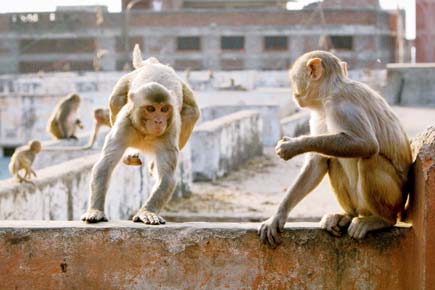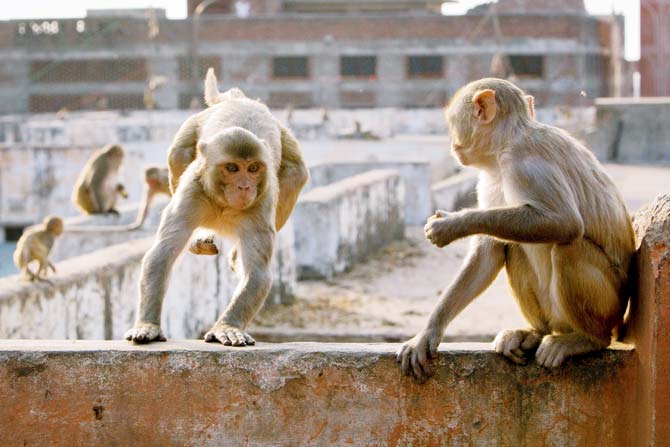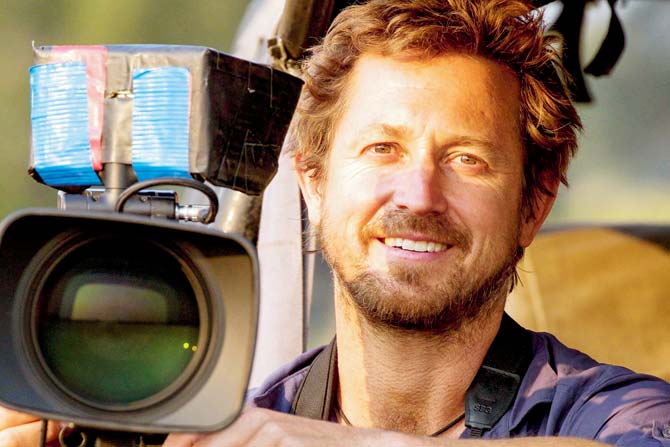Aussie biologist Dr Chadden Hunter talks about taking the Indian audience on an emotional roller coaster as Emmy-nominated Planet Earth 11 premiere's next week


A group of Rhesus macaques making their way across Jaipur, India. Pic/ Fredi Devas, Copyright BBC
ADVERTISEMENT
Not very long ago, renowned Australian wildlife biologist and filmmaker Dr Chadden Hunter and his crew were in Kazakstan to film the critically endangered Saiga antelopes for a documentary. The team, he recalls, went deep into the middle of nowhere, driving for days before they could see the calving herds. Little did they realise that they were about to witness one of the "biggest biological tragedies" of their lives. While the shoot was on, a virulent, mysterious disease swept through the population and killed around 1,50,000 of them in just three days. "That was the most upsetting thing I have ever seen in nature," Hunter says, during a telephonic chat from the UK. "We feared that we were watching the entire extinction of the species." Fortunately, this story did have a happy ending. The fragile, yet incredibly resilient animals bounced back the following year, Hunter tells us.
This event is among the many iconic incidents that have been recorded in Hunter's epic six-episode nature documentary Planet Earth II, which premieres in India on Sony BBC Earth tomorrow. Shot across 40 countries over a period of two years, the documentary has been presented and narrated by Sir David Attenborough. With 10 recent nominations at the Emmys, and a British Academy Television Award (BAFTA) for the Snakes versus Iguana chase, the show has already wowed audiences globally for its compelling portrayal of natural history. "It's like watching a dramatic Bollywood film," says Hunter, producer of the show. "There's a lot of drama, and the hero might die and it could make you cry, but the idea is to take you on an emotional roller coaster ride."
Incidentally, an integral part of this series was shot in Ladakh, Jodhpur, Jaipur, Kaziranga and Mumbai's Sanjay Gandhi National Park. "India is so diverse, and has a wonderful range of habitats. We were spoilt for stories here," says Hunter. "But, what's interesting is that the country has a long tradition of its people getting along with wildlife," he says.

Dr Chadden Hunter
Hunter encapsulated this relationship in the Cities episode, which documents the urban leopards of Mumbai, the macaques of Jaipur and the langurs of Jodhpur, and how they cohabitate with humanity. While talking about the city's leopards in particular, the biologist, points out that not all animals can live in a small park surrounded by a city. "But, it's a good example of how when the urban sprawl of humanity makes a decision that they want some nature in their lives, it can be made possible," he says. "A lot of locals [in Mumbai] really appreciate that park and it makes Mumbai so dynamic. It's sometimes hard for urban development, but the city planners [here] have ensured that they keep that space green. The rewards will be seen over years and years."
What he, however, found most fascinating from his time spent shooting in India was the poojas they participated in before filming in Assam's Kaziranga National Park. "Before we went shooting, the national park guards would waft some incense on our camera, and even the jeep we were travelling in, and pray to a shrine of Ganesha, to bring us good luck. It was a sweet way to start the day at sunrise, and also helped us reflect on what we were doing, and be grateful for that."
The show has also had its fair share of controversies, with many critics deriding it for being too brutal. "Viewers have different levels of sensitivity. Generally, we filmed what we saw, and we wanted to be true to nature and keep it real. Nature has to eat as well, and there are some scenes viewers might find that disturbing." But, the idea, he says, was to offer a richer, un-cut experience of nature.
 Subscribe today by clicking the link and stay updated with the latest news!" Click here!
Subscribe today by clicking the link and stay updated with the latest news!" Click here!






